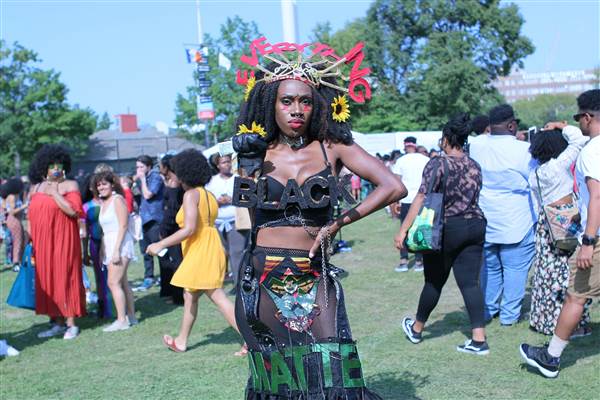
By Angelique Roche, NBCBLK
Over the past 12 years Afropunk — which started in Brooklyn, New York with just one stage and a skateboard park — has become a cultural haven celebrating Black culture and alternative Black music.
As the festival has evolved and spread its arms around the world from London to Johannesburg, many things have changed — the artists, the size, the locations — but the space for expression that Afropunk not only creates but also cultivates, has remained constant.
Photographers have gathered images of the funky-eclectic outfits, body art, wearable fashion and beautiful hairstyles worn by artists and attendees of the festivals, but few have captured why these images are so culturally and politically important.
Artists, creatives and activists spend all year planning designs intended to not only be photo-worthy, but to make statements about Blackness through their work.
In an age of free speech rallies and increasing support for Confederate statues and Nazi symbols of hate and oppression, many looked forward to the space created by Afropunk for self-expression and promotion of Black culture. Others took advantage of the opportunity to promote and inform people about Black history and the radical beauty of expressing Blackness.
From artists wearing hand-painted signs reading “F— Alt Right” to designers like Peter Gaona of ReformedSchool using eco-friendly materials to create fashion that teaches African-American history, fashion was more than fashion at Afropunk; for many it was an act of defiance.
“We’re literally wearing our movements on our chest,” said Michaela Angela Davis, a writer and image activist. Davis’ platform MAD FREE partnered with Gbenga Akinnagbe’s clothing line Liberated People to create a line of t-shirts. Each t-shirt features a pro-feminist message like “Patriarchy is a Bitch” and “Liberated Woman.” In addition, part of the proceeds from sales are donated to various nonprofit organizations including Black Women’s Blueprint and Planned Parenthood.
From Davis’s perspective, Black beauty itself is an act of defiance. “Our sense of extreme beauty, our sense of exquisite expression is radical. We’re doing stuff with our body and our hair that nobody else can do. We’re doing that because it is our instinct to make beauty and create culture,” said Davis. “But it’s also radical to express Blackness because of the white oppressive beauty standard that very few people in the world can achieve. [Expressing Blackness is] a direct affront to that.”
Read the entire story here.

